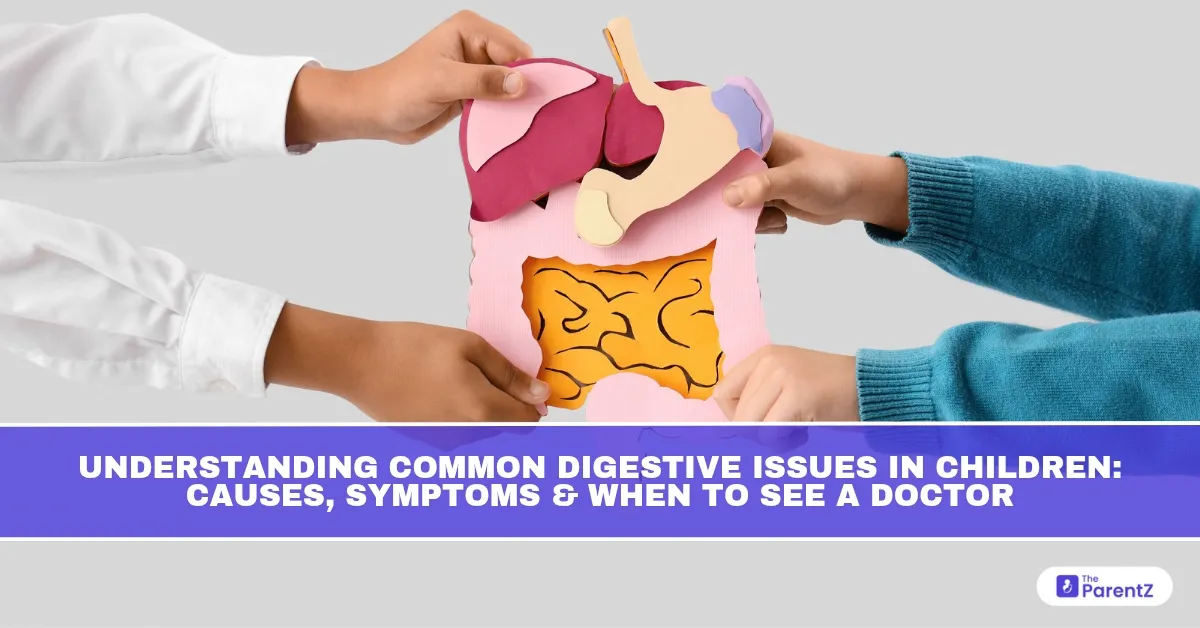Tummy aches are among the most frequent complaints in children, ranging from a passing discomfort to signs of an underlying digestive problem. While most cases are mild and self-limiting, some gut-related issues may require medical evaluation and management. Understanding the possible causes of your child’s abdominal discomfort is the first step toward ensuring their digestive health and comfort.
Young children often struggle to describe their symptoms clearly, making it even more important for caregivers to recognize patterns and know when to seek help. Gut health plays a vital role in immunity, nutrient absorption, and overall well-being, making it crucial to address digestive concerns early and appropriately.
Common Digestive Issues in Children
1. Constipation
One of the most common gastrointestinal problems in children, constipation is often due to poor dietary fiber intake, inadequate water consumption, or withholding of stools.
Symptoms:
- Hard, dry stools
- Infrequent bowel movements (less than 3 per week)
- Pain during defecation
- Abdominal bloating or cramps
Management:
- Increase dietary fiber (fruits, vegetables, whole grains)
- Ensure adequate hydration
- Encourage regular toilet routines
- Consult a pediatrician for stool softeners if needed
2. Gastroenteritis (Stomach Infection)
Often caused by viruses like rotavirus or norovirus, gastroenteritis can also be bacterial or parasitic in origin.
Symptoms:
- Sudden onset of vomiting and diarrhea
- Abdominal pain
- Fever
- Dehydration (dry lips, reduced urine, lethargy)
Management:
- Oral rehydration therapy (ORS)
- Continue breastfeeding/formula in infants
- Avoid sugary or carbonated drinks
- Seek medical help if symptoms persist beyond 2–3 days or worsen
3. Gas and Bloating
Excess gas can cause pain, especially in younger children who swallow air while crying, feeding, or talking.
Symptoms:
- Passing gas
- Bloating or tight belly
- Intermittent crying or discomfort, especially post meals
Management:
- Burping after feeds (in infants)
- Avoid gas-producing foods (beans, carbonated drinks, cabbage)
- Gentle abdominal massage or warm compress
4. Food Intolerances
Unlike food allergies, intolerances (like lactose intolerance) do not involve the immune system but cause digestive discomfort due to enzyme deficiencies.
Symptoms:
- Gas, bloating, or diarrhea after consuming specific foods
- Recurrent abdominal pain without infection
- Symptoms often linked to dairy or gluten
Management:
- Elimination of triggering food
- Consultation with a pediatrician or pediatric dietitian
- Use of lactose-free or hypoallergenic formulas when indicated
5. Acid Reflux (GERD)
Gastroesophageal reflux is common in infants and may persist into early childhood in some cases.
Symptoms:
- Frequent spitting up or vomiting
- Arching of the back during or after feeding
- Irritability or refusal to eat
- Persistent cough or sore throat
Management:
- Upright feeding position
- Smaller, more frequent meals
- Thickened feeds under medical guidance
- Antacid medication if prescribed
6. Irritable Bowel Syndrome (IBS)
Seen in older children and adolescents, IBS is a functional disorder without structural abnormalities.
Symptoms:
- Recurrent abdominal pain relieved by passing stool
- Alternating diarrhea and constipation
- Bloating, incomplete evacuation
Management:
- High-fiber diet
- Stress management
- Regular physical activity
- Medical evaluation to rule out other conditions
When to See a Doctor
Parents should seek immediate medical attention if:
- The child has severe or persistent abdominal pain
- There is blood in vomit or stool
- Unexplained weight loss or poor growth
- Recurrent vomiting or diarrhea
- Signs of dehydration (sunken eyes, low urine output, dry mouth)
- Behavioral changes like lethargy or irritability
Conclusion
Tummy troubles in children are common, but they should never be dismissed without careful observation. Recognizing patterns, encouraging a healthy diet, and seeking timely medical guidance are essential to safeguarding your child’s digestive health. With early detection and proper care, most gut issues can be effectively managed, ensuring your child grows up healthy, active, and comfortable.








Be the first one to comment on this story.